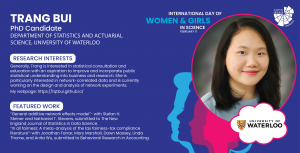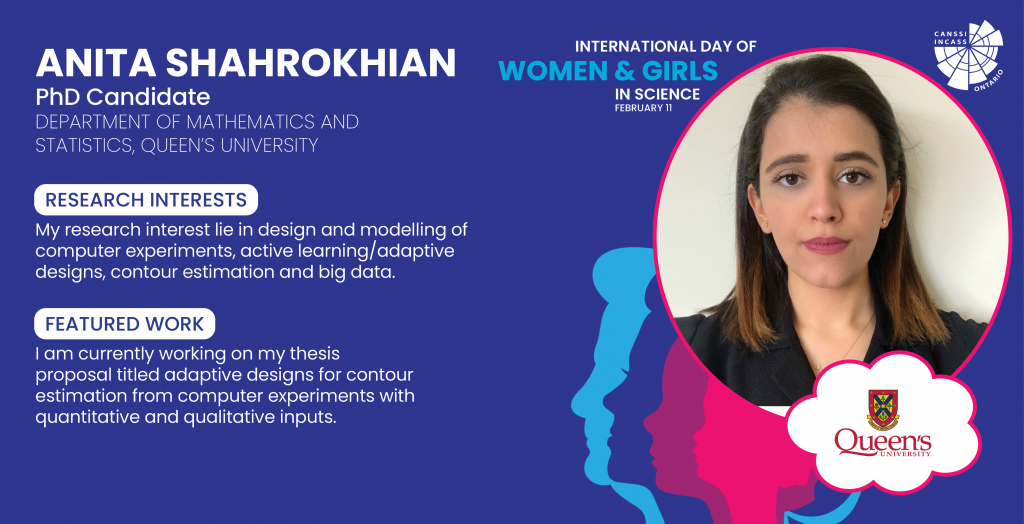
2023 International Day of Women and Girls In Science: Trang Bui
Trang Bui, PhD Candidate Department of Statistics and Actuarial Science,

Department of Mathematics and Statistics, Queen’s University
I am currently working on my thesis proposal titled adaptive designs for contour estimation from computer experiments with quantitative and qualitative inputs.
My research interest lie in design and modelling of computer experiments, active learning/adaptive designs, contour estimation and big data.
https://www.linkedin.com/in/anita-shahrokhian/
I have always enjoyed doing research and learning new things. During my master’s degree at the Memorial University of Newfoundland, I realized that to be an expert in this field, I need time to explore a topic in depth. I was inspired by the idea of doing a Ph.D. in a more up-to-date research area, and with the support of my previous supervisor Professor Yanqing Yi, I entered Queen’s university and work under the supervision of Professor Chunfang Devon Lin. My main goal was to work on my skills in time management, be a problem solver by researching, and later in the future I will be qualified for many more opportunities in my career.
I started my literature review in Gaussian process model in computer experiments and active learning. First, I focused on computer experiments with quantitative inputs, but in real applications in scientific and engineering processes, there are other factors involved that make the problems more complex. Currently, I am working on my thesis proposal titled adaptive designs for contour estimation from computer experiments with quantitative and qualitative inputs. I am working on the advantage of using adaptive designs for contour estimation from computer experiments with quantitative and qualitative inputs. Also, for large-scale computer experiments with mixed inputs, the problem would be more challenging due to the effect of qualitative inputs that I am working on how to use a localized model to have computing efficiency.
These days we see more women now in the industry and academia who are working in this field. A few helpful lessons I learned from my supervisor, Professor Lin, is that one should be curious about problems, not afraid of new problems, and to be a fast learner. At the same time, consistency and staying motivated is the key in this field, as sometimes you will identify how to use old methods to resolve new problems, which takes time. The best advice is hard work always pays off.

Trang Bui, PhD Candidate Department of Statistics and Actuarial Science,

Maryam Y. Onifade, PhD Candidate Department of Mathematics and Statistics,

Emma Kroell, PhD Candidate Department of Statistical Sciences, University of

Anita Shahrokhian, PhD Candidate Department of Mathematics and Statistics, Queen’s University

On December 22, 2015, the United Nations General Assembly established
CANSSI Ontario
10th Floor, Suite 10072
700 University Avenue
Toronto, ON M5G 1Z5